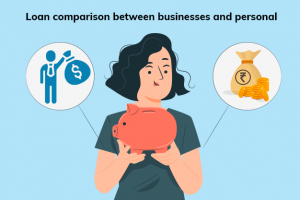Taking Away Points:● Business loans help fund entrepreneur endeavours and maintain your company’s operations. |
Both outstanding and corporations may require additional funding, but what distinguishes a personal loan from a business loan? While there are many variations in the loans themselves, the main distinction is the party liable for paying back the debt: firms pay back business loans, whereas people pay back personal loans.
It is important to understand what each of them means and essential to dive into the details of the differences.
Business Loans:
 Business loans are supplied for specific purposes, as opposed to personal loans, which are sanctioned for the borrower’s use. Your company’s financial history will typically need to be carefully examined to receive approval for a business loan.
Business loans are supplied for specific purposes, as opposed to personal loans, which are sanctioned for the borrower’s use. Your company’s financial history will typically need to be carefully examined to receive approval for a business loan.
What advantages do company loans offer? Personal loans are divided into secured and unsecured categories, whereas business loans are tailored for specific uses, giving them more diversity. To avoid dangerous lending practices, lending institutions will seek to offer a financing option that meets the loan applicant’s financial demands.
A financial product called a business loan, created especially for enterprises, enables them to borrow money for company expenses. Entrepreneurs use business loans to cover costs associated with launching a new company, growing an existing one, or buying inventory or equipment.
Compared to personal loans, corporate loans often have longer payback terms and higher interest rates, and they are frequently secured by the company’s assets, including real estate or inventory.
Personal Loans:
The purpose of personal loans, also called consumer loans, is to provide borrowers with funding for their personal needs. There are two types of personal loans: secured and unsecured.
If the loan is secured, the lender will demand that you or a co-signer who stands as a guarantor for you guarantee the total amount of your assets. In other words, if it’s a secured loan, the lending institution will have the right to seize your assets or contact your guarantor and demand payment for the unpaid sum if you don’t make payments and default on the loan.
A personal loan is given to a person for personal purposes, such as debt consolidation, house improvements, or wedding funding. Personal loans typically have a shorter repayment duration and lower interest rates than company loans since they are unsecured or not secured by any kind of security.
The term “signature loan” is also used to describe unsecured loans. With unsecured loans, the lender determines whether to approve the requested loan amount based on the borrower’s ability to repay the debt.
Lenders generally take on more risk when making unsecured loans than secured ones. Whether secured or unsecured, repayment is often given over a predetermined period that the borrower and the lender have already agreed upon.
Financial institutions such as banks, credit unions, and online lenders frequently offer loans for both personal and business purposes.
Business and personal loans: How are they different?
| Differences | Business Loan | Personal Loan |
| Use of capital | Direct business expenses like stocking goods, purchasing supplies and paying suppliers, and business loans can cover other similar costs. | Personal loans can be used to pay for both direct company costs, like startup funding, and indirect lifestyle costs, like owning a home close to where you work or a car, among other things. |
| Tax deduction | Depending on local regulations, the interest on company loans may be tax deductible. | Since they are not regarded to be income, personal loans are not tax deductible. |
| Term | Loans for businesses may have longer repayment terms. | Personal debts must be repaid more quickly. |
| Collateral | Collateral is used as security for business loans. | The majority of personal loans don’t require collateral. |
Business loans are created especially to assist firms in meeting their financial demands and objectives. For instance, a business loan might be used for working capital, to finance a startup, to expand an existing business into new markets or real estate, to buy goods or equipment, to buy an existing company, or even to hire new personnel.
Personal loans are types of finance used for personal needs instead of company needs. Personal loans can be used to support a variety of charges, including paying off credit card debt, covering medical bills, or covering educational fees. Unlike many commercial loans, personal loans are unrestricted, allowing the borrower to allocate the money any way they see fit.
Another significant distinction is who is accountable for loan repayment. A business loan is linked to your company; if you can’t repay it for some reason, that will reflect negatively on your company’s credit history. On the other side, personal loan repayment problems will impact your credit.
Business Capital USA helps you get business loans for small businesses in case you need more funds. Get short-term funding here ahead of the upcoming holiday season and help your business ring as planned.
